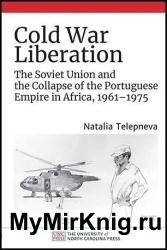 Название: Cold War Liberation: The Soviet Union and the Collapse of the Portuguese Empire in Africa, 1961–1975 Название: Cold War Liberation: The Soviet Union and the Collapse of the Portuguese Empire in Africa, 1961–1975
Автор: Natalia Telepneva
Издательство: The University of North Carolina Press
Серия: New Cold War History
Год: 2022
Страниц: 288
Язык: английский
Формат: pdf (true), epub
Размер: 15.8 MB
Cold War Liberation examines the African revolutionaries who led armed struggles in three Portuguese colonies—Angola, Mozambique, and Guinea-Bissau—and their liaisons in Moscow, Prague, East Berlin, and Sofia. By reconstructing a multidimensional story that focuses on both the impact of the Soviet Union on the end of the Portuguese Empire in Africa and the effect of the anticolonial struggles on the Soviet Union, Natalia Telepneva bridges the gap between the narratives of individual anticolonial movements and those of superpower rivalry in sub-Saharan Africa during the Cold War.
Drawing on newly available archival sources from Russia and Eastern Europe and interviews with key participants, Telepneva emphasizes the agency of African liberation leaders who enlisted the superpower into their movements via their relationships with middle-ranking members of the Soviet bureaucracy. These administrators had considerable scope to shape policies in the Portuguese colonies which in turn increased the Soviet commitment to decolonization in the wider region. An innovative reinterpretation of the relationships forged between African revolutionaries and the countries of the Warsaw Pact, Cold War Liberation is a bold addition to debates about policy-making in the Global South during the Cold War.
The Carnation Revolution offered an opportunity for rapid decolonization, which was a priority for the MFA. In May, the leader of Portuguese Socialists, Mário Soares, was appointed foreign minister and immediately entered into talks with the PAIGC. The MFA Coordinating Committee preferred quick transfers of power to the liberation movements. Thus, in 1974, Lisbon struck deals to transfer control to the PAIGC in Guinea-Bissau and to FRELIMO in Mozambique. In Angola, however, the transition was much more complicated because the liberation movement was split between three nationalist organizations—FNLA, MPLA, and UNITA—with each relying on regional allies and international donors for support.
In January 1975, the Portuguese negotiated a power-sharing agreement between the three movements with independence set for November 11, 1975. However, the peace did not last, and by June, armed clashes among rival organizations on the streets of Luanda turned into a full-scale civil war. As the violence intensified, the Soviet Union and Cuba stepped up their support for the MPLA, while the United States and South Africa threw their weight behind the FNLA and UNITA. In October, South Africa invaded Angola to shore up the FNLA and UNITA, and Havana responded by sending Cuban troops in support of the MPLA.
Contents:
Introduction
Chapter One Mediators of Liberation: Nikita Khrushchev, the Soviet Bureaucratic Elite, and the Cold War in Africa
Chapter Two Revolutionaries: The Portuguese Empire and the Rise of African Nationalism
Chapter Three Cataclysm: The Angolan Uprising and Its Aftermath, 1961
Chapter Four Diplomacy of Liberation: Exile Politics, International Alliances, and Maoism in Africa, 1961–1964
Chapter Five From the Barrel of a Gun: Weapons, Training, and Strategy of Guerrilla Warfare, 1964–1970
Chapter Six Disappointments: The Portuguese Offensives and Detente, 1970–1974
Chapter Seven Triumph to Tragedy: Revolution in Portugal and the Angolan Civil War, 1974–1975
Conclusion
Notes
Bibliography
Скачать Cold War Liberation: The Soviet Union and the Collapse of the Portuguese Empire in Africa, 1961–1975
|